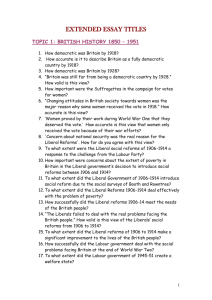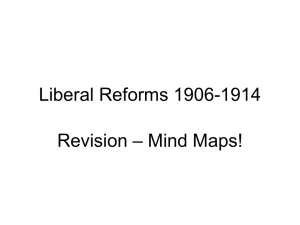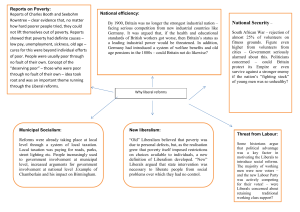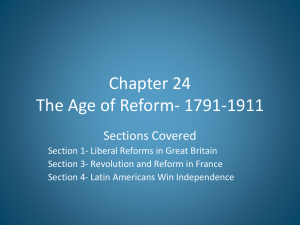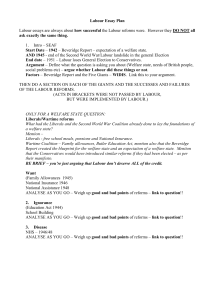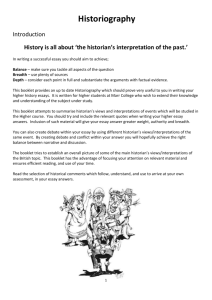GB Essay Questions
advertisement
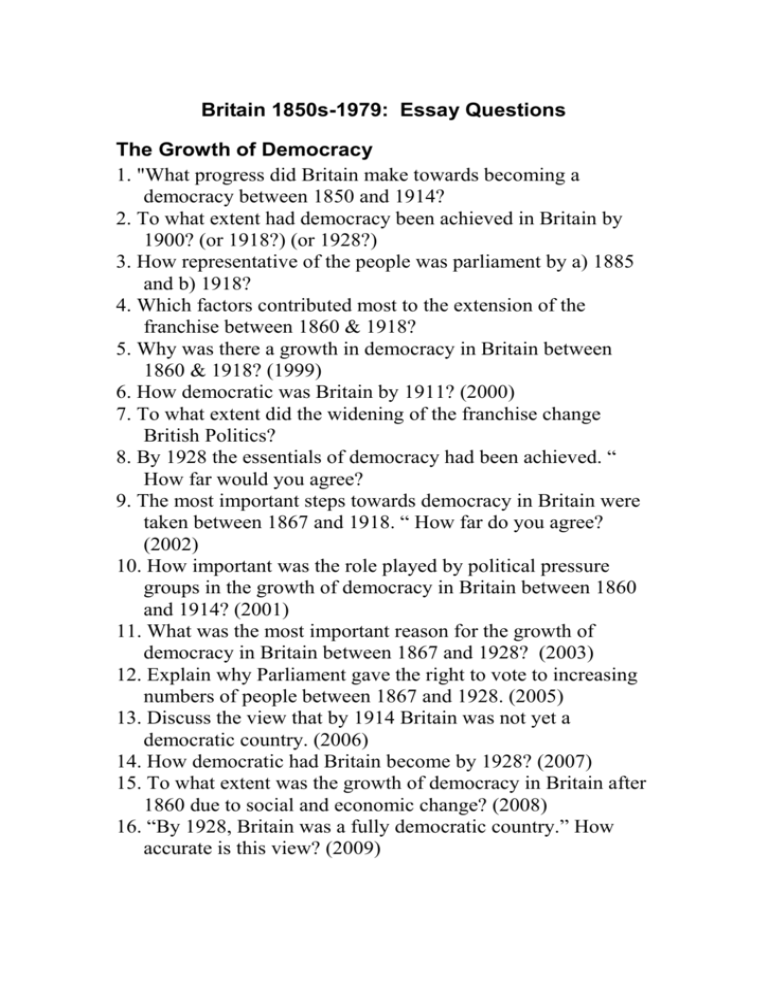
Britain 1850s-1979: Essay Questions The Growth of Democracy 1. "What progress did Britain make towards becoming a democracy between 1850 and 1914? 2. To what extent had democracy been achieved in Britain by 1900? (or 1918?) (or 1928?) 3. How representative of the people was parliament by a) 1885 and b) 1918? 4. Which factors contributed most to the extension of the franchise between 1860 & 1918? 5. Why was there a growth in democracy in Britain between 1860 & 1918? (1999) 6. How democratic was Britain by 1911? (2000) 7. To what extent did the widening of the franchise change British Politics? 8. By 1928 the essentials of democracy had been achieved. “ How far would you agree? 9. The most important steps towards democracy in Britain were taken between 1867 and 1918. “ How far do you agree? (2002) 10. How important was the role played by political pressure groups in the growth of democracy in Britain between 1860 and 1914? (2001) 11. What was the most important reason for the growth of democracy in Britain between 1867 and 1928? (2003) 12. Explain why Parliament gave the right to vote to increasing numbers of people between 1867 and 1928. (2005) 13. Discuss the view that by 1914 Britain was not yet a democratic country. (2006) 14. How democratic had Britain become by 1928? (2007) 15. To what extent was the growth of democracy in Britain after 1860 due to social and economic change? (2008) 16. “By 1928, Britain was a fully democratic country.” How accurate is this view? (2009) Women’s Movement and Democracy 1. Why did it take so long for women to get the vote? 2. Did militancy help or hinder women' struggle for political equality in the years before the First World War? 3. How important a part did events during the First World War play in the decision to grant women the vote? 4. “By 1928 democracy had been achieved.” How far do you agree? 5. To what extent was the granting of the right to vote to women due to their role during the First World War? (2001) 6. Explain the lack of success of the movements for women’s suffrage in achieving their aims by 1914? (2002) 7. How effectively did the activities of Women’s Rights movements promoted their cause? 8. How effectively did the movements for women’s suffrage promote their cause? (2004) 9. To what extent would you agree that the importance of the Suffragettes in gaining votes for women has been exaggerated? (2005) 10. “It was the militant suffragette campaign, more than any other factor, that led to the achievement of female suffrage in 1918.” How valid is this view? (2007) 11. “ Their contribution during World War 1 was the main reason why the majority of women gained the right to vote in 1918”. How valid is this view? (2008) The Liberal Reforms 1. To what extent did the Liberal Government (1906 - 1914) set up a Welfare State in Britain? 2. “More a product of political necessity than of social concern.” Is this a fair judgement on the social reforms of the Liberal Government 1906 - 1914?” 3. “Between 1906 and 1914 the real causes of poverty were tackled successfully by government action.” To what extent would you agree with this statement? 4. To what extent were the Liberal Social Reforms (1906 1914) prompted by feelings of genuine concern for the masses? 5. To what extent were the Liberals’ Social and Trade Union Reforms a response to the growth of the Labour movement between 1906 - 1914? 6. “Their intention was never to lay down the foundations of a welfare state but simply to provide specific solutions to specific social problems.” How far do you agree with this assessment of the Liberals’ Social Reforms? 7. Would you agree that there was a marked change in attitude and policies towards poverty and social problems in Britain in the first decade of the 20th century? 8. “They were prompted by a ground-swell of social pity.” Is this an adequate explanation for the introduction of social reforms in the period 1906 - 1914? 9. How effectively did the Liberal Government (1906 - 1914) deal with the problem of poverty? (2000) 10. Simply a response to the growth of the Labour Movement. How adequate is this explanation for the social reforms of the Liberal government between 1906-1914? (2002) 11. To what extent did the Liberal Reforms (1906-1914) improve the lives of the British people? (2003) 12. How far were the reports on poverty produced by Booth and Rowntree responsible for the Liberal social reforms of 19061914? (2005) 13. To what extent did the social reforms of the Liberal Government (1906-1914) improve the lives of the British people? (2006) 14. To what extent were the Liberal social reforms of 1906-1914 a response to the challenge from the Labour Party? (2007) 15. How important were concerns about the extent of poverty in Britain in the Liberal Government’s decision to introduce social reforms between 1906 and 1914? (2008) The Post War Labour Government and the Welfare State 1. “A document of far-reaching political and social consequences.” How true is this of the Beveridge Report? 2. "Britain should be praised for the significant advances made in education, housing and health between 1944 and 1951.” Do you agree with this view? 3. How true is it to say that the Labour Government of 19451951 set up the Welfare State? 4. How successful were the welfare reforms of the Labour Government of 1945-1951 in improving social conditions in Britain between 1945-1951? 5. Account for the successes and failures of the Labour governments' domestic policies between 1945 and 1951. 6. “The social reforms of the Labour government of 1945 - 1951 were successful in establishing a welfare state.” Do you agree? (1999) 7. How successfully did the Labour Government promote social welfare in Britain between 1945 and 1951? (2000) 8. How effective were the social reforms of the Labour Government of 1945-1951 in delaying with the problems facing Britain at the time? (2001) 9. The creator of the welfare state. How well deserved is this description of the Labour government of 1945-1951? (2002) 10. Assess the impact of the welfare reforms of the Labour Government 1945-1951 on the lives of the British people. (2004) 11. How successful were the social reforms introduced by the Labour Government of 1945-1951? (2005) 12. How successfully did the Labour government of 1945-1951 deal with the social problems identified in the Beveridge Report of 1942? (2007) 13. How significant an impact did the welfare reforms of the Labour Government 1945-1951 have one the lives of the British people? (2009)
